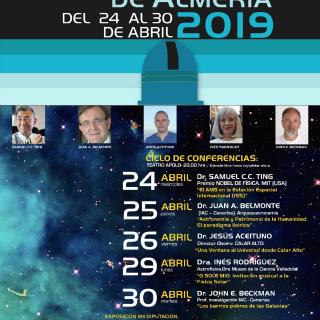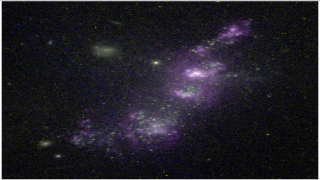Bibcode
Zaragoza-Cardiel, J.; Font-Serra, J.; Beckman, J. E.; Blasco-Herrera, J.; García-Lorenzo, B.; Camps, A.; González-Martín, O.; Ramos-Almeida, C.; Loiseau, N.; Gutiérrez, L.
Referencia bibliográfica
Monthly Notices of the Royal Astronomical Society, Volume 432, Issue 2, p.998-1009
Fecha de publicación:
6
2013
Número de citas
14
Número de citas referidas
13
Descripción
We have observed the Arp 270 system (NGC 3395 and NGC 3396) in Hα
emission using the Galaxy Hα Fabry-Perot spectrometer on the 4.2 m
William Herschel Telescope (La Palma). In NGC 3396, which is edge-on to
us, we detect gas inflow towards the centre, and also axially confined
opposed outflows, characteristic of galactic superwinds, and we go on to
examine the possibility that there is a shrouded AGN in the nucleus. The
combination of surface brightness, velocity and velocity dispersion
information enabled us to measure the radii, FWHM, and the masses of 108
H II regions in both galaxies. We find two distinct modes of physical
behaviour, for high and lower luminosity regions. We note that the most
luminous regions show especially high values for their velocity
dispersions and hypothesize that these occur because the higher
luminosity regions form from higher mass, gravitationally bound clouds
while those at lower luminosity H II regions form within molecular
clouds of lower mass, which are pressure confined.
Proyectos relacionados

Estudios Cinemáticos, Estructurales y de Composición, de los Medios Interestelares e Intergalácticos
El objetivo básico del proyecto es investigar la evolución de las galaxias mediante el entendimiento de la interacción del medio interestelar y las estrellas. La técnica principal que utilizamos es la cinemática bidimensional de galaxias enteras observada por nuestro instrumento GHaFaS, un interferometro Fabry Perot en el telescopio William
Prof.
John E. Beckman

Grupo de Estudios de Formación Estelar GEFE
El proyecto interno GEFE está enmarcado en el proyecto coordinado, ESTALLIDOS, financiado por el plan nacional desde el año 2001. El ultimo proyecto aprobado es ESTALLIDOS 6.0 (AYA2016- 79724-C4-2-P). En el proyecto GEFE trabajamos en base al caso científico del proyecto ESTALLIDOS 6.0. Los estallidos de formación estelar (Starbursts o SB) son
Casiana
Muñoz Tuñón